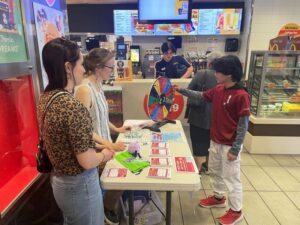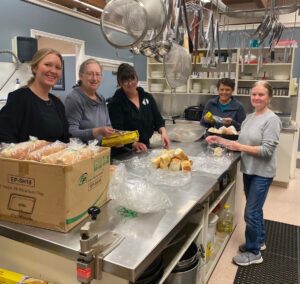A program targeted at helping children who have experienced or witnessed family violence or anger-related issues is starting this week. The Roots Program is provided by the Whitecourt Family Violence Initiative (FVI) and occurs several times yearly. The program is split into three age categories and runs in a group setting. The age categories are 8-12, 13-14, and 15-17.
Lynden Schwindt, Whitecourt Family Violence Liaison, said the program is for children with various experiences. “It can be anything from actual physical violence to lots of yelling and screaming and maybe things getting thrown around and maybe getting broken. There’s a spectrum of situations where a child may be appropriate for the program.”
The program is free for the community and provides a non-judgemental and confidential intake. “If transportation is needed, we offer that as we don’t want there to be any barriers,” explained Schwindt. The goal is to help children regulate their emotions and handle stressful situations differently. “What we see is what we do, so we want to give an alternative to managing emotions when things are tense.”
Building resiliency and self-confidence go hand in hand with the program too. Schwindt said that over the years of running the program, they received feedback showing children used what they’ve learned. “We’ve gotten great feedback over the years about children implementing their emotional regulation skills with themselves and even teaching peers when they see a classmate having dysregulation.”
The first class of the six-week program started this week. “We are still accepting intakes, and we do offer the program a few times throughout the year. If this is something a parent maybe wants to think on for a little bit, they do have that opportunity. They can call and do an intake assessment anytime throughout the year,” explained Schwindt.
One of the most significant components of the program is teaching children about mindfulness. Schwindt said they use it because it is a natural stress reduction tool. “When we are in a heightened state, it’s hard to think logically. We just have the emotional brain going on.” She said they use several mindfulness techniques, including the 5-4-3-2-1 strategy. “What are five things you can see? What are four things you can touch? What are three things you can hear?” The final ones are two things you can smell and one thing you can taste.
“We also have some breathing techniques that we will practice with the kids. Those have proven to be pretty helpful with regulating emotions,” explained Schwindt. Talking about emotions and their origin is another big part of regulating. “We talk about where we feel the emotions in our body because once we can identify it, we can also identify what things make us have bigger emotions. When we are prepared for a triggering event, we are better equipped with our responses.”
Schwindt said the violence, whether witnessed by the child in the family home or done by the child, doesn’t have to be recent. She said it could be from past experiences. If parents feel that learning these tools would be beneficial to their child’s development, then the program is there for them to take. “We do three to five sessions per year, and in each session, it’s an average of five to ten children.”
Schwindt said that everyone deals with stress daily and that people’s reaction to it often determines the outcomes. “Sometimes there are consequences for inappropriate responses to stress. If we learn these tools in our childhood, early adulthood, we (can) have a greater success because we have the skills to implement them and that can carry through along the life span.”
The weekday sessions, if not manageable now, are easily accessible the next time the program runs. “I don’t want to deter people from calling in once they find out we’ve started (the current session). We offer this throughout the year, so definitely call anytime to determine your next entry point into the program.”
Schwindt said they would accommodate a child entering the program mid-session if necessary. “We know how important the program is to families. Family violence is never ok, and unfortunately, it does happen. We want the best outcome for the kiddoes so that they don’t have a life where they perpetuate an unhealthy cycle for themselves or others.” For more information, parents and caregivers can call 780-778-6300.







More Stories
Gearing up for another season of cars, cruising and camaraderie
Big dreams lead a talented local youth to Nashville
It’s Youth Week in Whitecourt until Friday